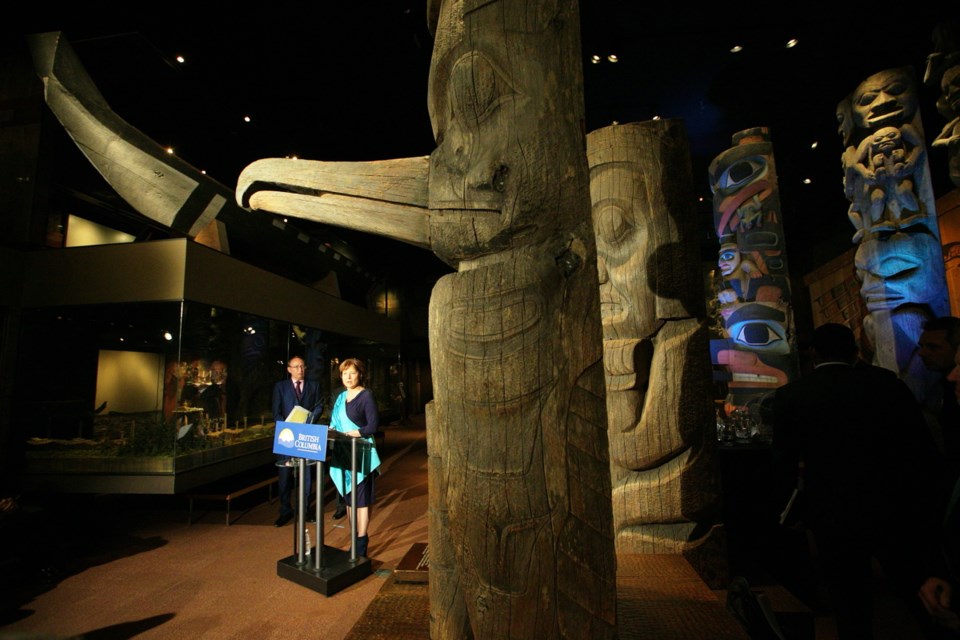In 1904, a sacred shrine composed of 88 carved figures, 16 human skulls and a small building was taken from a First Nation on the west coast of Vancouver Island and brought to the American Museum of Natural History in New York, where it remains in storage.
The Yuquot Whalers’ Shrine from the Mowachaht/Muchalaht Nation on Nootka Island is one example of significant ancestral items and remains that should be returned to B.C. First Nations, Premier Christy Clark said at the Royal B.C. Museum on Tuesday.
“First Nations in British Columbia, over many centuries, saw grave robbers, saw ceremonial regalia, shamanistic materials, grave goods and human remains taken from their territories and their homes and into public museums, private collections, universities all over the world,” Clark said in announcing a plan to recover and repatriate such items.
The goal is to return the artifacts to First Nations and help display or store them while communities build appropriate facilities for the items.
“It is long past time those items, of such spiritual significance to First Nations of British Columbia, found their way home,” Clark said. “It is time for those institutions that have taken them away to give them back.”
Clark announced the campaign on the 20th anniversary of National Aboriginal Day, which recognizes aboriginal achievement and reconciliation across the country. It is not a statutory holiday, except in the Northwest Territories. One of the 94 calls to action issued by the Truth and Reconciliation Commission on the legacy of residential schools, which wrapped up last year, is for the federal government to make it a statutory holiday.
Clark said new statutory holidays can be a hard sell. Meanwhile, she said, “we need to find ways to celebrate … by marking the day with important actions like this one that will … move all the work of reconciliation forward.”
Clark has sent a letter to U.S. President Barack Obama asking for his co-operation in treating all North American indigenous peoples with the same courtesy as American Indians, who by law can request that cultural items be returned. She noted the successful return of items such as ancestral remains from Tseycum First Nation from the American Museum of Natural History in 2008.
Several local First Nations elders and chiefs attended the event in support of the government’s efforts, which Songhees Chief Ron Sam called a “good gesture.”
“I’m hoping it adds to what the communities have already been doing,” said Sam, whose First Nation has a catalogue of items for repatriation as part of its ongoing 23-year treaty process.
B.C. announced other local initiatives to mark the day, including plans to give 14 colleges and universities $75,000 each to expand and create programs for aboriginal students.
Royal Roads University was the sole Vancouver Island recipient of the one-time funding from the Education Ministry — part of a larger aboriginal jobs and training plan.
Royal Roads will use the funds to set up an Indigenous Education Leadership Team and student collective, and host a National Aboriginal Day event.
In Langford on Tuesday, members from 10 First Nations, four schools and local organizations celebrated the official opening of a new affordable-housing project for aboriginal families.
The mixed-use development is home to 36 aboriginal families and the new provincial headquarters of M’akola Development Services and Housing Society.
The organization owns and operates the building and services, funded in partnership with three levels of government and the Aboriginal Housing Management Association.



